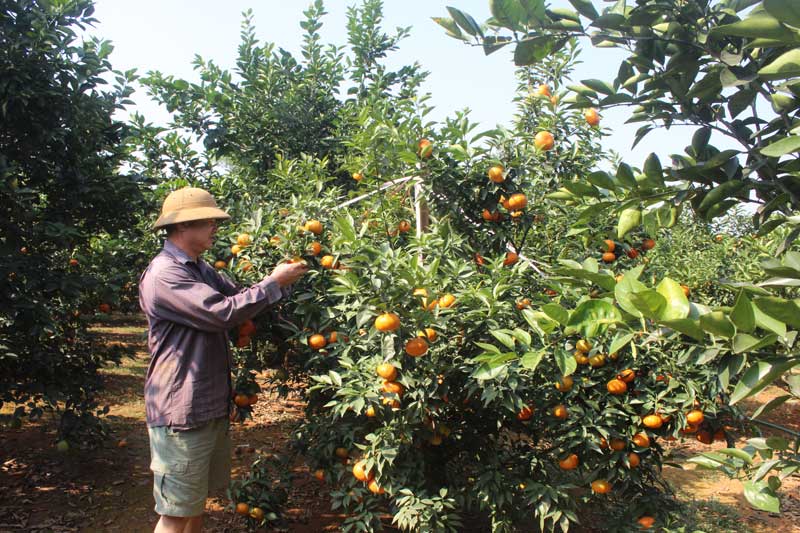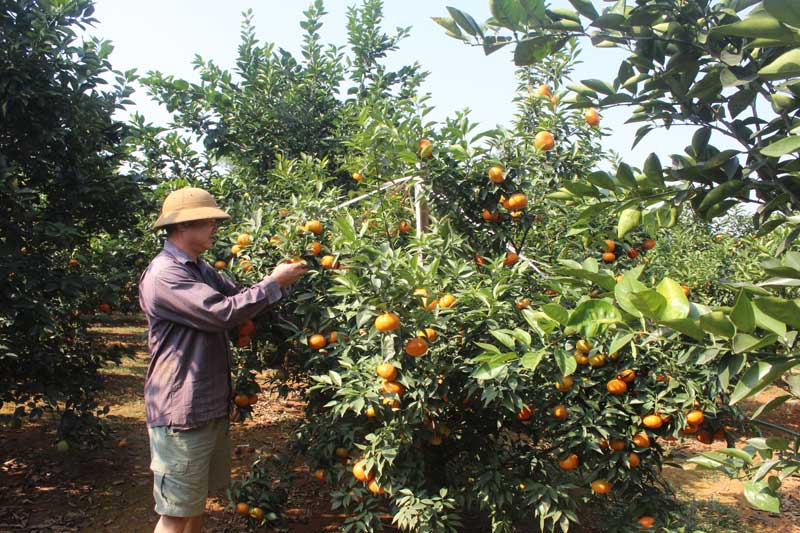
(HBO) – The living standards of people in Lac Son district, the northern mountainous province of Hoa Binh have been improved and rural areas in the locality have seen positive changes as seven communes in Lac Son have been recognised as new-style rural areas.

Residents
in Vo hamlet, An Nghia commune, Lac Son district, invest in citrus trees which generate
good income.
Since the launch of the new-style rural area building, An Nghia
commune has been given a facelift, where people enjoy higher living standards. The
commune has planted citrus trees to replace plants with low-economic values.
Since 2013, An Nghia has developed 48.42ha of citrus trees, mostly in the
hamlets of Bum (19.85ha),Vo (5.05ha), and Doi 5 (15.9ha). The commune’s average
per capita income exceeds 26 million VND and the poverty rate drops to over 10
percent. During 2011-2017, An Nghia mobilised over 91 billion VND to implement
the new-style rural area programme, of which the commune’s budget and
contributions by locals was nearly 23 billion VND or 25.1 percent.
According to Vice Chairman of the Lac Son district People’s
Committee Nguyen Huy Nhuan, the district has carried out a movement encouraging
people to unite in building new rural areas. The movement has been responded by
departments, sectors and localities.
Through the communications work, people of all social strata in
the district have understood more about new-style rural area building and
constructively participated in the campaign. More than 168.2 million VND was
mobilised in 2017. Of the total, capital from the national target programme on
new-style rural areas was nearly 23.9 million VND; centralised infrastructure
capital of the province and the district was 51.6 million VND; capital from
integrated programmes, 31.2 million VND; credit loans, 44.6 million VND; and
capital contributed by the public, 17 million VND. Thanks to the joint efforts,
rural infrastructure has been invested, meeting people’s demands.
Apart from new-style rural area building, Lac Son has restructured
the agricultural sector towards value chain connection, focusing on plants and
animals that are of the locality’s advantages. The district has encouraged
communes to replace 373.48ha of rice with other plants. The area of citrus
trees reaches 551.2ha.
However, Nguyen Huy Nhuan, Vice Chairman of the Lac Son People’s
Committee, the number of new-style rural communes in Lac Son remains low due to
limited capital.
In 2018, the district aims to pour 77 billion VND in building new
rural areas and turn Yen Nghiem commune into a new-style rural area./.
According to data from the Hoa Binh Provincial Party Committee, the industrial production index for the first six months of 2025 is estimated to have increased by 20% compared to the same period last year. This marks the highest year-on-year growth rate for this period since 2020.
In the first six months of 2025, Hoa Binh province’s export turnover was estimated at 1.145 billion USD, marking an 18.11% increase compared to the same period in 2024. Import turnover was estimated at $ 804 million, a 17.15% increase, which helped the province maintain a positive trade balance.
The lives of the ethnic minority farmers in Tan Lac district have gradually improved thanks to the new directions in agricultural production. This is a testament to the collective strength fostered through the professional associations and groups implemented by various levels of the district’s Farmers’ Union.
With the motto the "product quality comes first,” after nearly one year of establishment and operation, Muong village’s Clean Food Agricultural and Commercial Cooperative, located in Cau Hamlet, Hung Son Commune (Kim Boi district), has launched reputable, high-quality agricultural products to the market that are well-received by consumers. The products such as Muong village’s pork sausage, salt-cured chicken, and salt-cured pork hocks have gradually carved out a place in the market and they are on the path to obtaining the OCOP certification.
In the past, the phrase "bumper harvest, rock-bottom prices" was a familiar refrain for Vietnamese farmers engaged in fragmented, small-scale agriculture. But today, a new spirit is emerging across rural areas of Hoa Binh province - one of collaboration, organisation, and collective economic models that provide a stable foundation for production.
Maintaining growing area codes and packing facility codes in accordance with regulations is a mandatory requirement for agricultural products to be eligible for export. Recently, the Department of Agriculture and Environment of Hoa Binh province has intensified technical supervision of designated farming areas and packing facilities to safeguard the "green passport" that enables its products to access international markets.



